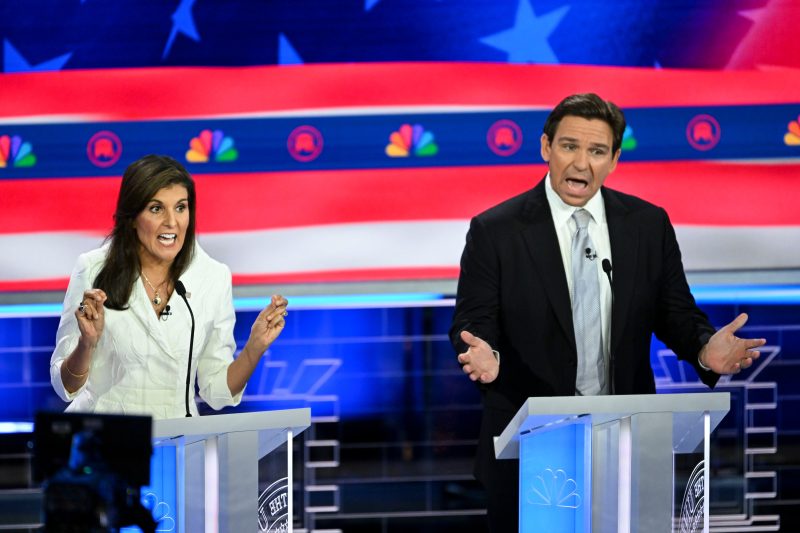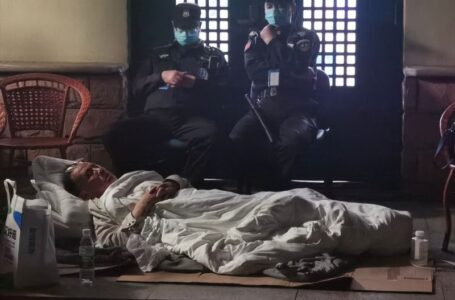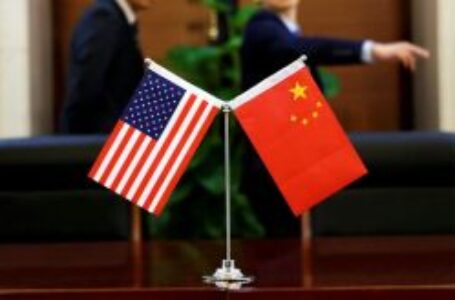Pro-Haley ad puts words in DeSantis’s mouth as rivals trade China barbs


“DeSantis called China ‘Florida’s most important trading partner.’ DeSantis even allowed a Chinese military contractor to expand just miles from a U.S. naval base.”
— Voice-over on a campaign ad by SFA Fund, a super PAC that backs former South Carolina governor Nikki Haley (R), released Jan. 2
In the battle between Florida Gov. Ron DeSantis and former South Carolina governor Nikki Haley to emerge as the main Republican alternative to Donald Trump, both sides have lobbed hyperbolic and false claims about their rival’s record on China. We’ve repeatedly given Pinocchios to super PACs associated with these candidates for filling the airwaves with absurd charges and countercharges. We even included DeSantis and Haley — and Trump — on our list of Biggest Pinocchios of 2023 for China-related claims.
It’s a new year, but the attacks haven’t stopped. This ad — which opens with the assertion that “Ron DeSantis is lying because he’s losing” — appears designed to counter specific attacks made by the DeSantis campaign, using examples that mirror those used against Haley.
For instance, DeSantis has charged that Haley actively recruited Chinese companies to South Carolina when she was governor — a claim backed up by news articles and video of Haley celebrating those deals. (The Haley campaign says the threat perception posed by China has changed since Haley was governor from 2011 to 2017.) A super PAC associated with DeSantis also has run ads claiming that Haley made a serious national security blunder when as governor she welcomed a Chinese fiberglass factory to her state. The ad falsely suggested the factory was designed to spy on a military base five miles away.
So this ad tries to turn the table — claiming that DeSantis said China was Florida’s most important trading partner and that he allowed a Chinese company to expand near a military base. Neither claim is true.
“DeSantis called China ‘Florida’s most important trading partner’ ”
The ad runs this quote with an image of DeSantis laughing. But the source for the quote in the ad is listed as “EnterpriseFlorida.com accessed 11/1/2023.” That language suggests the quote is recent — but the Enterprise Florida Inc. (EFI) website doesn’t exist anymore and you can find it only by searching the Wayback Machine run by the Internet Archive. That’s because DeSantis last May signed legislation that folded elements of Enterprise Florida, a public-private partnership designed to attract foreign investment, into a new agency.
We located this quote on an archived 2021 webpage, but it is not anything that DeSantis said. It’s lifted from boilerplate marketing language: “Asia and Florida share bilateral merchandise trade of over U.S. $30 billion annually, with the region now representing about one-third of Florida’s total trade with the world. China remains Florida’s most important trading partner and export destination in the region, but commercial ties with India, Vietnam, Malaysia and other countries in South East Asia have grown significantly in recent years.”
DeSantis became governor in 2019, and Enterprise Florida’s 2020 annual report describes how in 2019 the agency attended nine international trade shows and made presentations at three seminars “positioning Florida as an ideal business destination for Chinese companies.” Before Enterprise Florida was liquidated, DeSantis chaired the board.
But after the coronavirus pandemic emerged from China in 2020, DeSantis supposedly soured on the outreach to Beijing. The governor’s office told RealClearPolitics that in 2020, when DeSantis “realized the extent of EFI’s engagement with Chinese trade,” the governor “compelled EFI to shut down all such ties with Chinese companies.” However, in signing the legislation, DeSantis made no mention of China — and the chief sponsor of the bill has said he was motivated by the fact that the agency had “overpromised and under-delivered for years.”
In a statement, SFA Fund defended the use of the quote, saying that because DeSantis was chairman of Enterprise Florida, “this ultimately means that Enterprise Florida’s statement about China’s importance as a trading partner was a statement that DeSantis not only encouraged, but essentially gave breath to until it was no longer politically beneficial for him to do so.” The Enterprise Florida website was scrubbed just before Haley and DeSantis met in the November Republican primary debate, which SFA suggests is suspicious but which the governor’s office says was a coincidence as the replacement agency went online.
In any case, the ad is misleading viewers by putting old marketing copy in the governor’s mouth. He never said this.
“DeSantis even allowed a Chinese military contractor to expand just miles from a U.S. Naval base.”
The word “allowed” is doing a lot of work here. The source for this claim is a November New York Post article reporting that DeSantis “stayed quiet” when Cirrus Aircraft, a Minnesota-based personal aircraft manufacturer, added two locations in the Orlando area in 2022. China Aviation Industry General Aircraft, a unit of China’s state-owned Aviation Industry Corporation, in 2011 bought a controlling interest in Cirrus from Bahraini investors.
At one location, Kissimmee Gateway Airport, the company performs maintenance services, while the office, at Orlando Executive Airport, is for sales. The New York Post noted that the sales location was 12.7 miles away from the Naval Air Warfare Center Training Systems Division, a research and development arm of the Navy. The Orlando Business Journal quoted a company official as saying 30 jobs in total would be added.
DeSantis may have been mum on the deal, but it’s hardly the sort of investment that might earn the notice of a governor in a state as large as Florida.
Moreover, there is a big difference between this deal and the one that is the centerpiece of the DeSantis attack on Haley’s involvement with Chinese companies.
Haley in 2016 actively recruited the fiberglass company, a partially state-owned enterprise called China Jushi, as she has acknowledged. The South Carolina Coordinating Council for Economic Development, which is chaired by the state’s governor-appointed commerce secretary, provided about $7 million in incentives to facilitate the Jushi deal. Under the contract with Richland County, China Jushi would receive almost 200 acres of county-owned land free of charge if promised investments were made.
Haley greeted the announcement with a news release that called the deal “a huge win for our state.” On Facebook, she declared: “Get excited! China Jushi is creating 400 new jobs” and investing $300 million “right here in Columbia!”
By contrast, DeSantis appears to have had nothing to do with the Cirrus expansion. In fact, the first mention of the deal in the media was that a mystery firm was arriving. “Anonymous company seeks ground lease at Kissimmee Airport,” headlined the Orlando Business Journal. Our search of news reports could not find any connection between DeSantis or his administration and the expansion; PolitiFact reported similar findings.
As for a Cirrus sales office being located nearly 13 miles from a naval facility, that’s not a problem. The Navy center is not on a list of about 200 sensitive military facilities that would require government approval for land purchases by foreign entities within one mile of the facilities. Neither is Fort Jackson in South Carolina, which is five miles from the China Jushi factory.
This ad is an especially desperate attempt to muddy the waters. Some of DeSantis’s attacks on Haley’s recruitment of Chinese companies has been misleading or unfair, but that’s no excuse for inventing quotes or suggesting DeSantis had a role in a company’s expansion in Florida. SFA Fund earns Four Pinocchios.
(About our rating scale)
Send us facts to check by filling out this form
Sign up for The Fact Checker weekly newsletter
The Fact Checker is a verified signatory to the International Fact-Checking Network code of principles











